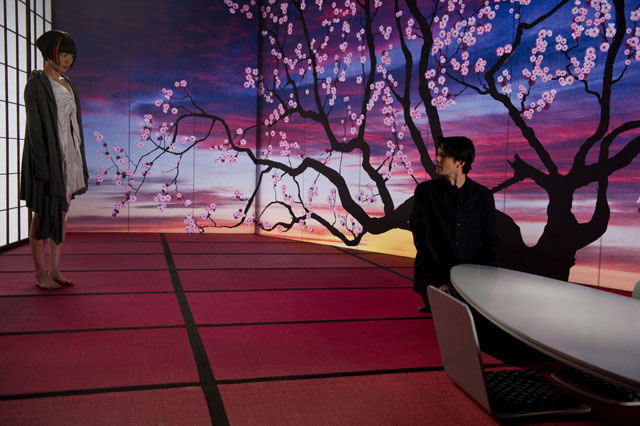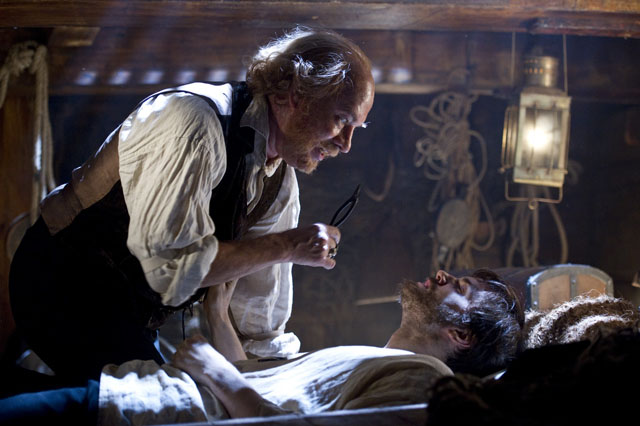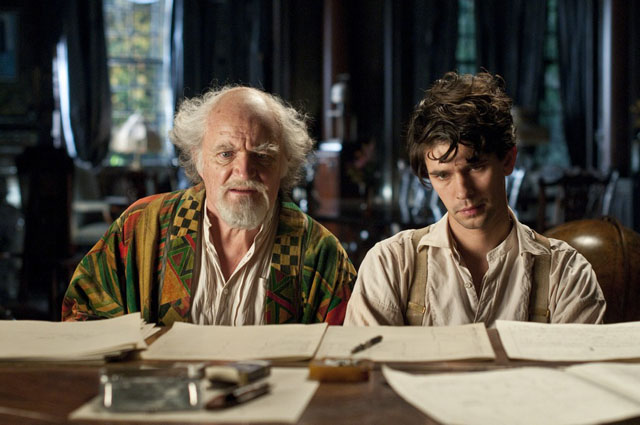“The standing ovation went on and on and on,” reports Michael Cieply in a quick dispatch to the New York Times following Saturday night’s premiere of Cloud Atlas in Toronto. “Granted, the audience at the Princess of Wales theater was heavily larded with friends of the family. The three directors—Tom Tykwer and Andy and Lana Wachowski—were on hand, along with at least 17 cast members, including Tom Hanks and Halle Berry, the two of whom account for a dozen roles. But enthusiasm of this sort can’t be faked. As the credits rolled, perhaps 700 people on the theater’s ground floor (we couldn’t see the balcony crowd) rose and applauded, as the minutes and myriad credits rolled by. Eventually, they formed surrounding the filmmakers. After a pause, the applause picked up again, and got loud, as Ms. Wachowski, with a shock of fire-engine red hair, hugged and kissed anyone in sight.”
“As I was writing Cloud Atlas, I thought, It’s a shame this is unfilmable,” novelist David Mitchell tells Aleksandar Hemon in a New Yorker piece on the film’s making. And Hemon grants that the book “is not a simple read, with its interlocking stories and a multitude of characters, distributed across centuries and continents. Each story line has a different central character: Adam Ewing, a young American who sails home after a visit to an island in the South Pacific, in the mid-19th century; Robert Frobisher, a feckless but talented Englishman, who becomes the amanuensis to a genius composer in Flanders, in the 1930s; Luisa Rey, a gossip-rag journalist who rakes the muck of the energy industry in 1970’s California; Timothy Cavendish, a vanity-press publisher who finds himself held captive in a nursing home in present-day England; Sonmi~451, a genetically modified clone who gains her humanity in a futuristic Korea, ravaged by consumerism; and Zachry, a Pacific Islander who struggles to survive in the even more distant future, after ‘the Fall,’ which seems to have endangered the planet and eradicated much of humankind. These characters are connected by an intricate network of leitmotifs—a comet-shaped birthmark crops up frequently, for instance—and by their ability to somehow escape the fate that has been prepared for them.”
In a 2006 portrait of Mitchell for the New Yorker, Daniel Zalewski noted that the “six archly distinct narratives… are spliced together, as if by a twitchy film editor. Five of the stories cut off, at a moment of high drama, like an old projector snapping the celluloid right in the middle of the big shoot-out; they resume, with equal abruptness, in the book’s second half.”
So, how do you make a film out of Cloud Atlas? “The answer is that the filmmakers have obliterated the structure altogether,” discovers the AV Club‘s Scott Tobias, “a radical ploy in itself, given that it’s the first thing anyone mentions about the book—and instead compresses the timelines into one long montage sequence, a symphony of artistry and tackiness. It’s like a Big Gulp version of Darren Aronofsky’s The Fountain, but much bigger and broader in scope, and with stories that disrupt each other more often as they syncopate…. There’s something fundamentally powerful about the film’s (and book’s) understanding of humankind as the push-and-pull between enslavement and freedom, though the directors are better off expressing its themes in a flurry of gorgeous images than in the overly explicit voiceover narration. (The New Age spirituality, on the other hand, is total bunk. (softstartrv.com) ) Still, Cloud Atlas is every bit the fiasco it seemed destined to be, but its failures at least have the courtesy of being bold, and those who connect with it will likely go all the way.”
“I think you’re being a bit too harsh, Scott,” replies Noel Murray. “I actually agree with you that Cloud Atlas whiffs big at times,” but: “I really don’t want to discount how boldly and effectively constructed this movie is. It’s like a two-hour-and-forty-minute version of the last half of Inception, keeping multiple plates spinning and reaching strong crescendos by cross-cutting action sequences between timelines.”
This “hugely ambitious, genre-jumping, century-hopping epic is parts Babel and Tree of Life, parts Blade Runner, Amistad and Amadeus, with added doses of gore, CGI, New Age kitsch, and more prosthetics than a veterans hospital in wartime,” writes Jordan Mintzer in the Hollywood Reporter.
Sean O’Connell at Movies.com: “The core performers snake through each plot like a band of eager day players, transporting us as far back as the Pacific Islands in 1849 and as far forward as Neo Seoul, circa 2144. And the versatile cast—which includes Tom Hanks, Halle Berry, Hugh Grant, Jim Broadbent, Susan Sarandon, Jim Sturgess, Keith David, Hugo Weaving and many more—are game to slip into several skins. Men play women. Women play men. African Americans play Caucasians. A dog plays himself, then gets shot for his troubles.”
“Hanks threw his acting weight around with the most relish fans have seen in a while,” writes Solvej Schou at Entertainment Weekly. “Sweaty and red-nosed as a greedy doctor in the 1800s, buff and covered with miniature face markings as hallucination-prone Zachry in the future, and best as totally ballsy, violent, head-shaved Brit writer Dermot Hoggins.”
More from the Playlist‘s Kevin Jagernauth, who finds the film “never quite coheres” and gives it a C-, HitFix‘s Drew McWeeney, for whom Cloud Atlas is “one of my two favorite films of the year so far,” Meredith Brody, who finds it to be “a fitfully entertaining mess,” and FirstShowing‘s Alex Billington, who declares it “a massive cinematic accomplishment on the grandest scale, an utterly enchanting, moving, remarkable storytelling masterpiece.”
Updates: At the House Next Door, Calum Marsh finds that all the narrative strands “share the fully consistent qualities of flat acting, shabby editing, and surprisingly uninspired design…. The rhythm of this thing—and when you’re composing something this dense, rhythm is everything—just feels entirely wrong, reducing what crumbs of dramatic or kinetic interest are scattered across its running time to dust. This isn’t simply a case of elements of the film working or not working; the entire array of ideas (both aesthetic and thematic) which make up the film are so badly integrated that even the smallest traces and flickers of light are snuffed out altogether. Nothing works because, almost by the very nature of its design, nothing can: It collapses so intensely under the weight of its own inanity and pretension that nothing at all is left standing.”
“At 163 minutes Cloud Atlas carries all the marks of a giant folly, and those unfamiliar with the book will be baffled,” warns Henry Barnes in the Guardian. “Yet it’s hard to wholly condemn the directors’ ambition.”
Updates, 9/10: “One man’s ambitious, iconoclastic, like-nothing-ever-before-seen passion project is another man’s Battlefield Earth,” blogs the LA Weekly‘s Karina Longworth, “and so it goes that for some of us who saw the film’s world premiere in Toronto last night, Cloud Atlas… is a truly stunning misuse of talent and resources, and for others, it’s the film of the festival, if not the year.” Karina suggests that the casting of the same actors in several roles is “an experiment in the self-designed mutability of the body (up to and including male actors playing women and at least one star apparently cast as a character of a different race); thematically, it builds to a series of variations on the idea that we are all the same on the inside regardless of our born and/or lived exterior, and should all be entitled to the freedom to look and behave in the manner most true to our inner selves…. Cloud Atlas is evidently personal, defiantly sincere, totally lacking in self-awareness, and borderline offensive in its gleeful endorsement of revenge violence against anyone who gets in the way of a good person’s self-actualization. The rest of the time, it’s just insipid, TV-esque in its limited visual imagination, and dramatically incoherent.”
“Moment by moment, scene by scene, story by story, I was enthralled,” blogs Roger Ebert. “What did it sum up to? What is the through line? I can’t say. Not today, anyway.”
Updates, 9/13: “The chases and explosions are fine but best thing is the montage—the often witty match- or ludicrous shock-cuts that transport the viewer back and forth in time from one epoch to another.” J. Hoberman for Artinfo: “I wouldn’t call The Cloud Atlas pure cinema but there are times when it resembles an Oscar night montage composed of clips from Blade Runner, A Clockwork Orange, One Flew Over the Cuckoo’s Nest, The Matrix, and One Million BC with odd intimations of Monty Python and Andrzej Żuławski’s On the Silver Globe. The mix and mash trumps the balderdash. ‘I believe there’s another world and I’ll be waiting for you there,’ someone says towards the end. Moi aussi… with a big bag of popcorn.”
“The episodes tend to stand or fall by how well their protagonists are cast,” notes the Telegraph‘s Tim Robey. “Ben Whishaw, sparingly used in the other periods, is snugly ideal as a waspish composer’s Tom Ripley-esque amanuensis in the 1930s. Largely escaping prosthetics (or gender-swapping), Jim Broadbent is always very obviously Jim Broadbent (and spikily effective as the composer), but comes into his own as shambolic publisher Timothy Cavendish in the present-day bit. Some of Mitchell’s most biting comedic writing may be a little dulled here, but the Ealing Comedy-style breakout from an old people’s home is frisky, crowd-pleasing stuff. Halle Berry whites up ever so weirdly as a Jewish socialite, but not for long, and she’s a minor revelation as the intrepid journalist in charge of the 1970s San Francisco section, a China Syndrome knock-off with equally good James D’Arcy as an ageing whistleblower (and link to the previous section). Meanwhile, Korean actress Doona Bae is pretty wonderful as Sonmi-451, a fabricant (clone) waitress in the New Seoul of 2144, talked out of her pre-programmed servitude by a rebel-philosopher lover (Jim Sturgess).”
Time‘s Richard Corliss finds Cloud Atlas to be “exceptional in its reach and ordinary in its particulars—an impressive, messy sprawl, nearly three hours long and, in emotional impact, an inch deep.”
“That Cloud Atlas‘ theme is no less than the actual quantifiable existence of love itself… promised a grandly ambitious disaster on the scale of Southland Tales (2006),” writes John Semley for Cinema Scope. “No dice. Where Kelly’s rapturous fuck-up is a preeminent example of reach exceeding grasp, the ludicrous Wachowski/Tykwer triple-threat drives Atlas‘ ostensible ambitions into blandly cross-cut monotony and thematic stupidity. Every time the film veers promisingly into arch-Wachowski territory—as in the Neo-Seoul segment, which builds out the ersatz topography of Speed Racer (2008)—Tykwer’s perfumed pomposity reels things back in, keeping the film from ever flying compellingly off the rails. There is nothing remotely noble, or interesting, about Cloud Atlas‘ seemingly inevitable failure. And Jesus Christ, is it ever fucking long.”
For Entertainment Weekly‘s Owen Gleiberman, “the hook of this movie is that Andy and Lana Wachowski and Tom Tykwer so clearly meant everything that they put in it.”
Updates, 9/15: “Tonally unsteady, with moments of self-aware comedy and many more presumably unintentionally funny ones, the movie is as deeply sincere as it is dopey,” writes Manohla Dargis in the New York Times. “It also, ahem, includes a scene of a novelist tossing a critic off a roof.”
For Vulture, Mina Hochberg talks with Hugo Weaving “about performing an S&M version of Nurse Ratched, working with Lana Wachowski, and why Cloud Atlas may ‘be too much’ for some people.”
Toronto 2012: a guide to the coverage of the coverage. For news and tips throughout the day every day, follow @KeyframeDaily on Twitter and/or the RSS feed. Get Keyframe Daily in your inbox by signing in at fandor.com/daily.






